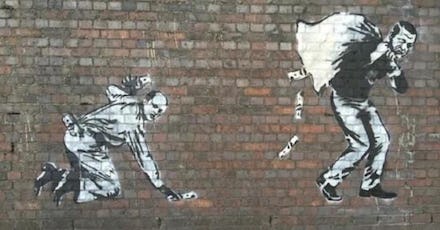New Banksy Graffiti Is Reigniting the Fight Between Turks and Kurds in London

"It's not #Banksy that's provoking with his street art, it's Erdogan himself that does the job," one tweet reads.
The author is referring to a new piece of graffiti in Harringay, north London, reportedly an authentic Banksy. It depicts the controversial Turkish President Recep Tayyip Erdogan sneaking away with a sack of money, while his son, Necmettin Bilal Erdogan, picks up the wads of cash falling out of the sack's bursting seams.
The image, first seen on Tuesday, is no doubt in reference to the alleged tapped recordings, leaked online in February 2014, of the father and son discussing how to embezzle millions of dollars.
And it appears to have touched a raw nerve.
Turks in support of Erdogan and his ruling AKP party have vandalized the work by splashing paint on the two figures' faces — on multiple occasions — while Kurds and Kurdish sympathizers have washed the splashes of paint off on those occasions. Splash, rinse, repeat. And the whole cycle has been documented on Twitter.
Given Erdogan and AKP supporters are attempting to minimize the work's reach, they have been less vocal about it on social media. However, there is no dearth of Kurdish voices online, lauding the graffiti and uniting under the hashtag #TwitterKurds.
The local Kurdish Community Center was even so kind as to invite the street artist for "a glass of tea" when he's next in the neighborhood.
Kurds are the largest minority in Turkey, accounting for around 15% of its population. The Kurds were promised their own nation-state in the wake of the first World War and as the Ottoman Empire was coming to an end, via the Treaty of Sèvres in 1920, which was agreed upon by the Allied powers who won the war and Turkish representatives. However, a few years later, the Treaty of Lausanne superseded Sèvres and the countries involved reneged on their promise. The Kurds were left displaced and distributed across Iraq, Iran, Syria, Turkey and Armenia.
What followed was almost 100 hundred years of Kurdish persecution in Turkey and Erdogan's government has been particularly unwelcoming, even banning the Kurdish language. Under AKP rule, people have had lawsuits brought against them by the government simply for using letters (such as Q, W and X) in official communication, which are only found in the Kurdish language and do not exist in Turkish.
So, suffice it to say, hullabaloo over this London-based street art has, funnily enough, created a political microcosm for a swath of the Middle East.
h/t Vocativ